It’s election time and you may — like many — be pulling out your hair wondering where to get good information about non-presidential candidates and state ballot measures. I am going to go through some of the tools I’ve learned to use as a freelance reporter, to help you get some baseline information about the people and issues on your ballot.
First up: who is giving your state candidates money? (Obtaining local candidate’s campaign contributions disclosures requires going through your local elections office).
Fundraising efforts across the state can range from the anemic $2,450 of Rep. John Corbett (R-Lake Park) to Speaker David Ralston’s (R-Blue Ridge) $110,100.
Digging through campaign contribution disclosure reports requires equal parts googling, channel your inner Mafioso, and taking it all with a grain of salt. What this information tells you is who your candidate is connected to. Are they people and organizations that share your values? Are they people and organizations trying to build relationships with legislators to influence them? Are they people and organizations trying to repair relationships with legislators after some contentious legislation was passed? How does this information compare to what your candidate says about them self?
It’s worth mentioning, too, that sometimes powerful people just know each other and do things for each other without an immediate benefit. Relationship building is a huge part of the game, and elected officials underestimate (or don’t care) just how much it influences their judgement.
Let’s first walk through what the campaign contribution disclosure reports look like and what kind of information they contain, and then dive into how to find them yourself for your state candidate. As an example, let’s look at Rep. Andrew Welch (R-McDonough), who is running unopposed.
~~~
Here is the document you will see (link here). The first page is basic information about the campaign. Then, you’ll see a summary page that goes over the total figures. After that is the itemized breakdown for contributions, expenditures, and loans.
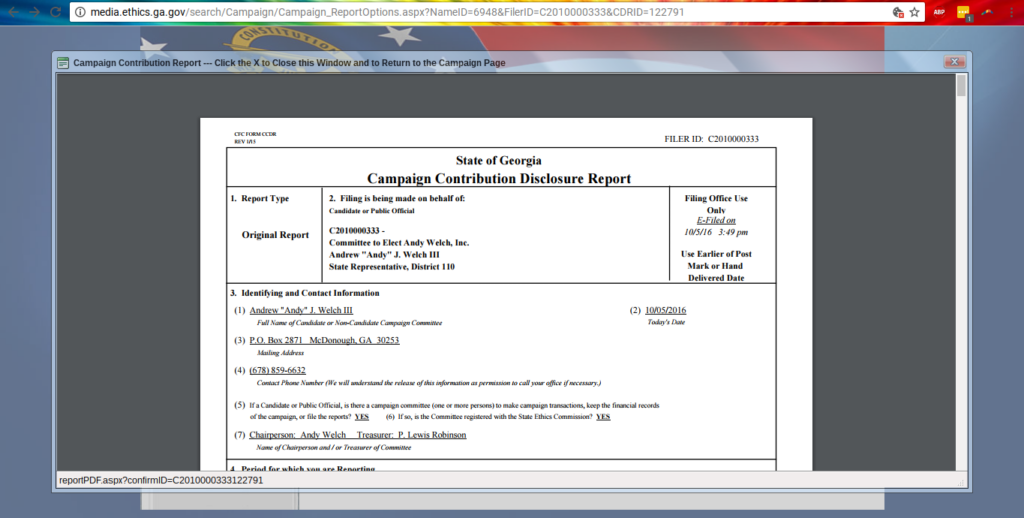
Next up is the summary page. Quite frustratingly, candidates aren’t consistent in how they calculate “previously reported” (i.e. cumulative) figures. Some candidates start fresh at every new campaign cycle, while others may keep the tally running from campaign to campaign. You may have to go back through old filings and do the math yourself to figure out which method your candidate used, especially if you are going to compare between candidates.
Also, Welch is running unopposed and will clearly be reelected, so it’s no surprise he has so little fundraising and expenditures to report. Candidates that are running unopposed, but hold lots of power, however, would likely see more activity. And, of course, candidates that are actively campaigning against another candidate should be fundraising at least $10-30,000 just to print signs, print flyers, get their website designed, maybe pay a staff person or some phone bankers. Candidates also fund their campaigns sometimes by loaning themselves money, which I just think is weird (but I’ve also never had a “spare” $45,000 that I could just do whatever I want with).
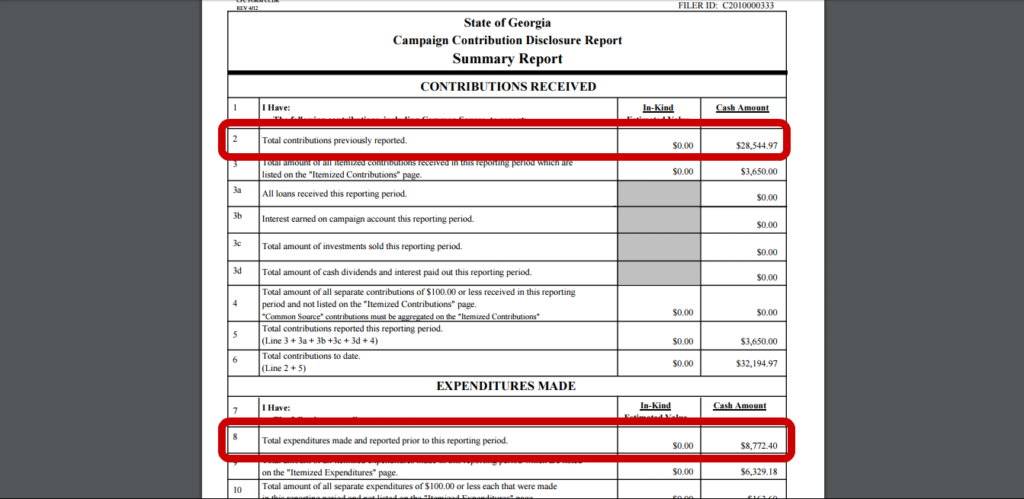
Now the fun stuff: itemized contributions. For Rep. Welch, here’s what I notice: these are mostly out-of-state donors, so guessing these are big corporations or PACs working in all states (or key states) on particular agendas, and so probably just donating pretty widely. I’d definitely contextualize these by looking at what committees Rep. Welch is on (here) and what legislation he’s sponsored (here).
Alkermes, Inc is a biopharmaceutical company with a Georgia office, I’ve seen them on several candidate’s reports. Biomedicine is actually quite big in Georgia, especially with the CDC and big research institutions, like Emory, located in Atlanta.
GUCA Political Action Committee is the Georgia Utility Contractors Association, Inc. PAC. I’m not very familiar with them, but I suspect a little bit of googling would help establish a baseline of who they are and what their goals are. (There also is a way to see everyone who GUCA has donated to, that view would definitely provide interesting information into the kinds of elected officials they are targeting).
Looking at the TitleMax donation, I’d want to find out if he serves on a committee that is important to them or sponsored legislation that would impact their business. Alternately, they may be proactively building relationships with key legislators. These title pawn and paycheck loan companies are starting to come under higher levels of scrutiny around their exploitative business practices, and states are looking to more tightly regulate what they do.
I also notice that someone who works for the Nelson Mullins & Scarborough law firm donated separately. I am not familiar with them, and it could be interesting to investigate more about this firm and who that employee is in relationship to state politics.
Other things you may see on your candidates report: expect lots of PACs, especially for businesses with big stakes in Georgia law, across all people and all parties. Medical associations, insurance companies, telecommunications, hospital groups, lawyer groups are all quite common. The folks trying to allow breweries to do direct sales are also making selective investments. Also, candidates donate to each other. It’s a way to bolster someone who isn’t a great fundraiser, but is a party favorite, a “team player,” or someone whose seat is being meaningfully challenged by the other party.
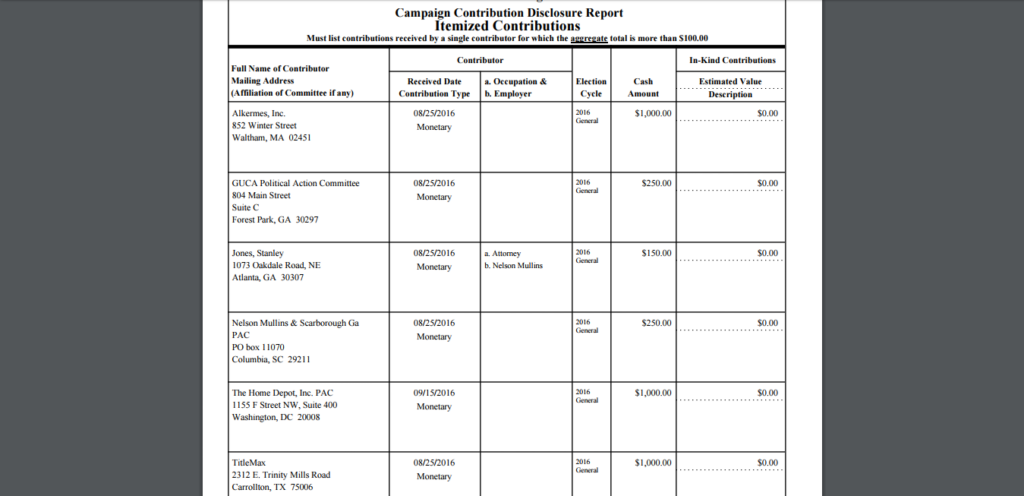
Itemized expenditures. For Rep. Welch, here’s what stands out to me: Alright, we see him donating to fellow Rep. Brian Strickland, who I think he’s fairly politically aligned with. Both are very principled conservatives. Deidra White is the conservative running against incumbent Dexter Sharper. Looking at her campaign filings would tell you more about what other Republicans, if any, have donated to her campaign. If it’s just him, then this may be his personal decision — she may be a friend, they may be politically aligned — or, if many Republicans are donating to her campaign, then it could be the donations are being solicited from the higher-ups in the party.
Apparently he was a Ted Cruz fan. Also, not surprisingly, a supporter of U.S. Sen. Johnny Isakson (R-Ga).
Super weird that he donated from his campaign (rather than personal) funds to the Georgia Life Alliance Committee. GLA is a pro-life group (the official Georgia chapter of the National Right to Life) and they lobby at the capitol. I haven’t seen this practice a lot and it just strikes me as ethically murky…to donate to a group that directly lobbies you and your colleagues. That also says a lot about his politics: (1) that he is pro-life, and (2) that he is aligned with GLA over Georgia Right to Life, which is ideologically more rigid in their politics.
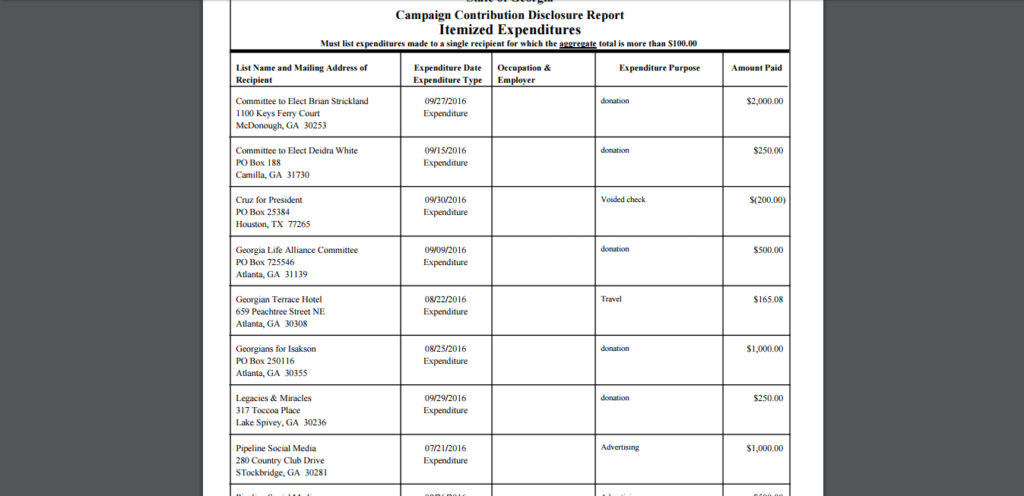
~~~
If you are interested and looking at these reports for your own state candidates, here’s how to do it:
(1) Go to ethics.ga.gov, which is the home of the Georgia Government Transparency and State Finance Commission, formerly known as the State Ethics Commission. Along the black bar at the top of the page, select “Search.”
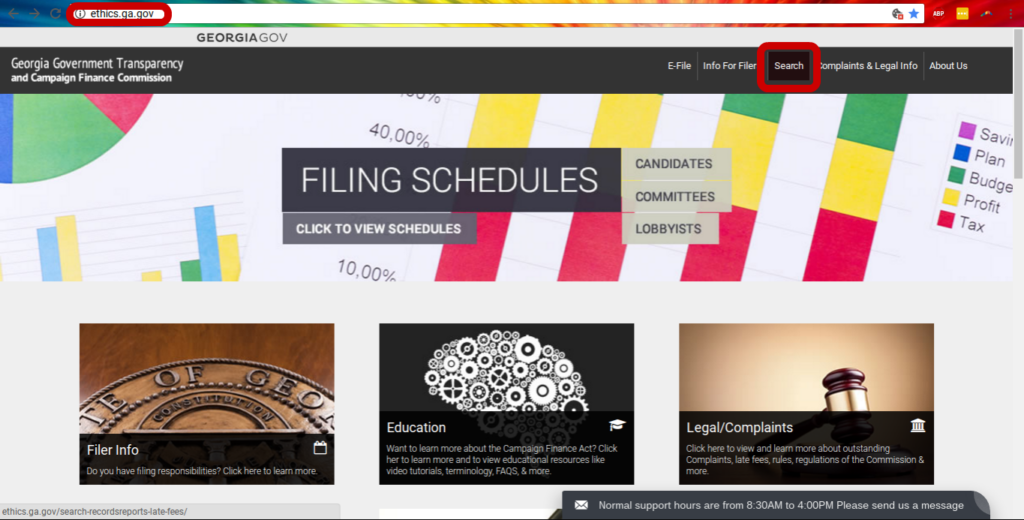
(2) Select “Campaign Reports” from the list.
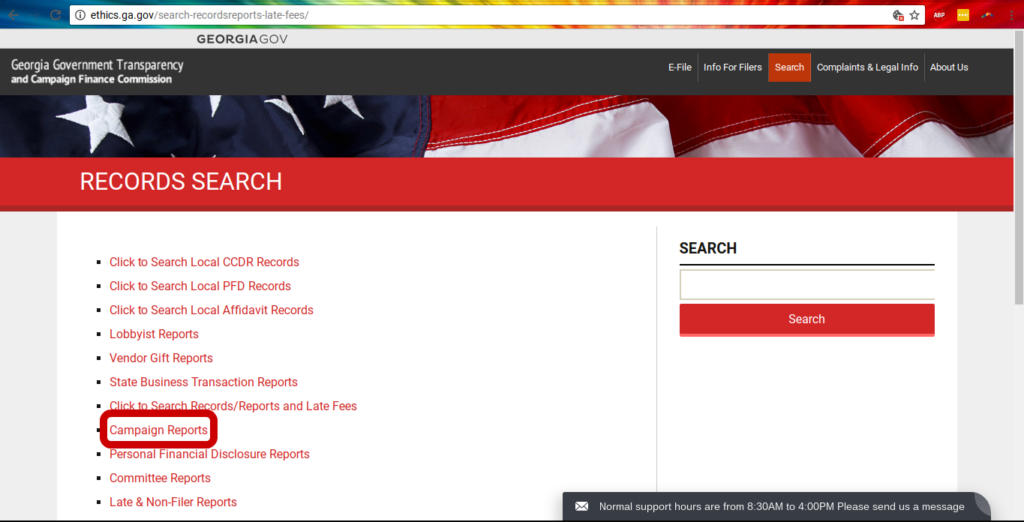
(3) You’ll be taken to a page called “CAMPAIGN REPORTS – NAME SEARCH.” Type in your candidate’s name in the box at the top of the page, and click “Search for Candidate.” As an example, let’s look at Rep. Andrew Welch (R-McDonough). Note: You can always navigate back to this page at anytime by selecting “Search By Name” from the menu on the sidebar.
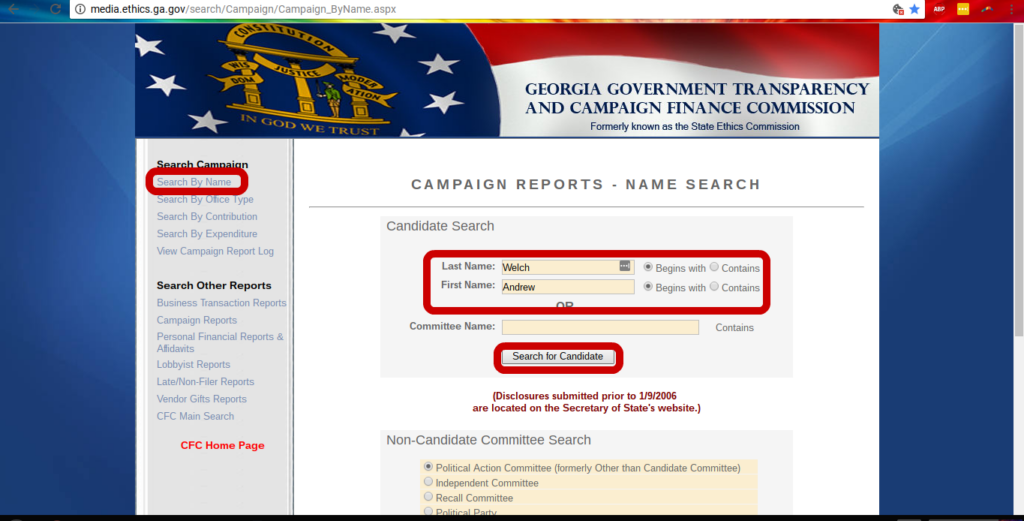
(4) Now select “View” for the appropriate candidate. Some things to note here: some candidates run under a middle name or nickname, and file under their legal name. Try searching just their last name if you don’t see them in the list. Alternately, some candidates will file under different variations of their name for different campaigns they’ve had. You’ll have to click around to find the current campaign documents you are looking for.
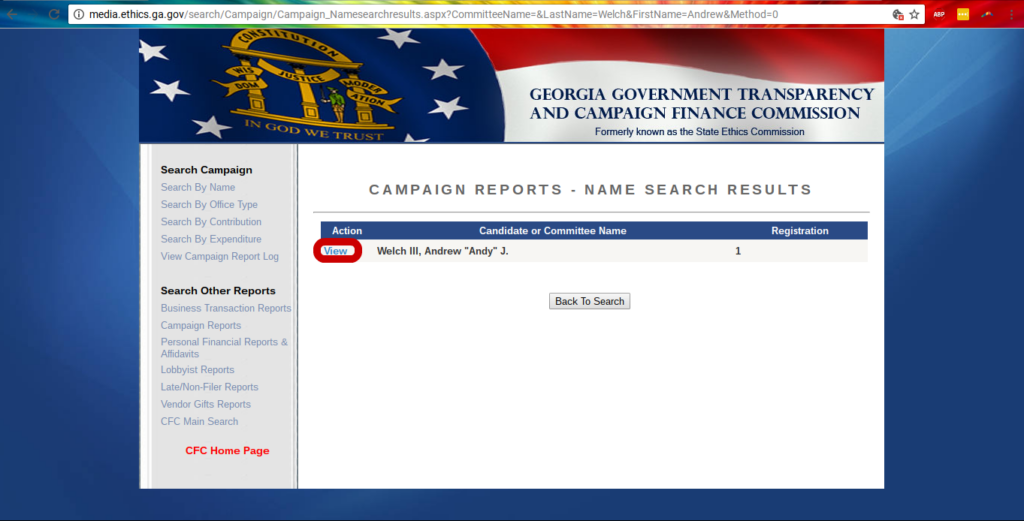
(5) Double check you found the right person. The “Office Sought” should be for the position they are currently running for on your ballot. “Status” should be “Active.” If it says “Terminated,” then the candidate is no longer running for that office. Under the first box, there is a tab that reads “Campaign Disclosure Reports,” and another tab that reads “Registration Information.” Clicking on the second tab will take you to some basic information about the campaign, we’re interested in the first tab right now.
Select “Campaign Contribution Reports – EFiled (Click to Expand Information).”
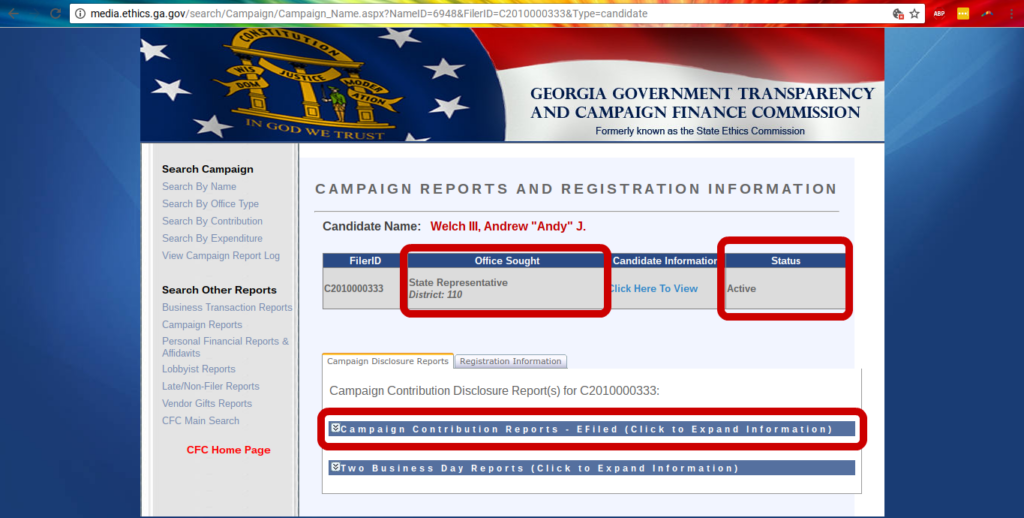
(6) Now you’ll see a list of all the reports the candidate has filed. Rep. Welch has reports going back to 2010, when he first ran for his House seat. Candidates have different reporting requirements for election years and non-election years.
- Note: If you like diving deep into numbers, it can be interesting to compare the same time period across campaigns (e.g. looking at the “September 30th – Election Year” reports for 2016, 2014, 2012 and 2010) in order to understand if the candidate is more or less active in fundraising at this point in the campaign cycle when compared to previous years. It can also be interesting to look at just the most recent two or three reports to see what’s changed over the course of one campaign. If a candidate had a primary opponent, but no general election challenger, then they may have more aggressively fundraised early on in their campaign. Also, state Senators and Representatives are not allowed to engage in fundraising or campaigning during the legislative session, so that often means big pushes from folks currently in office for donations before and after session.
Let’s take a look at the most recent filing. Select “View Report” next to the first report, “September 30th – Election Year.”
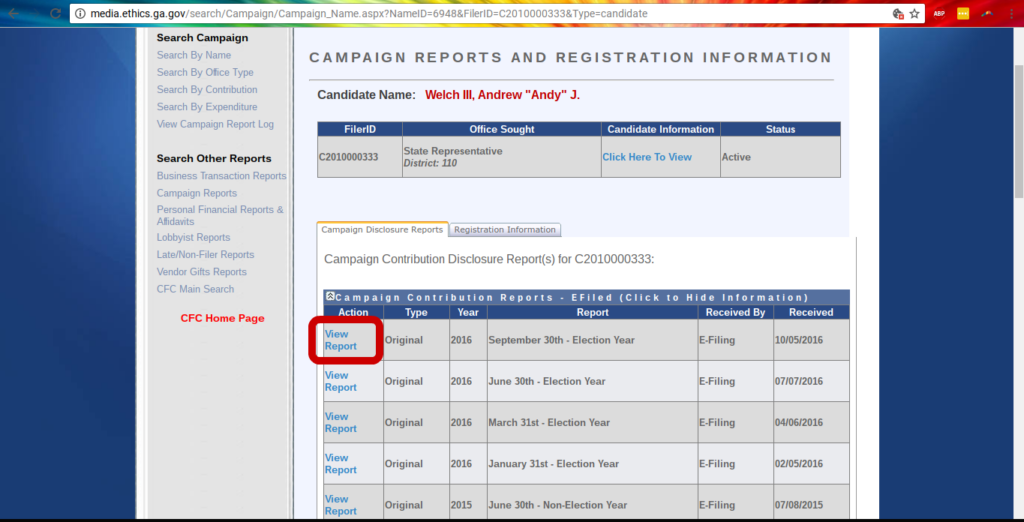
(7) Select “View Report in PDF,” to take a look at the entire report. (The other options are more excel friendly versions of the same information, broken into segments).
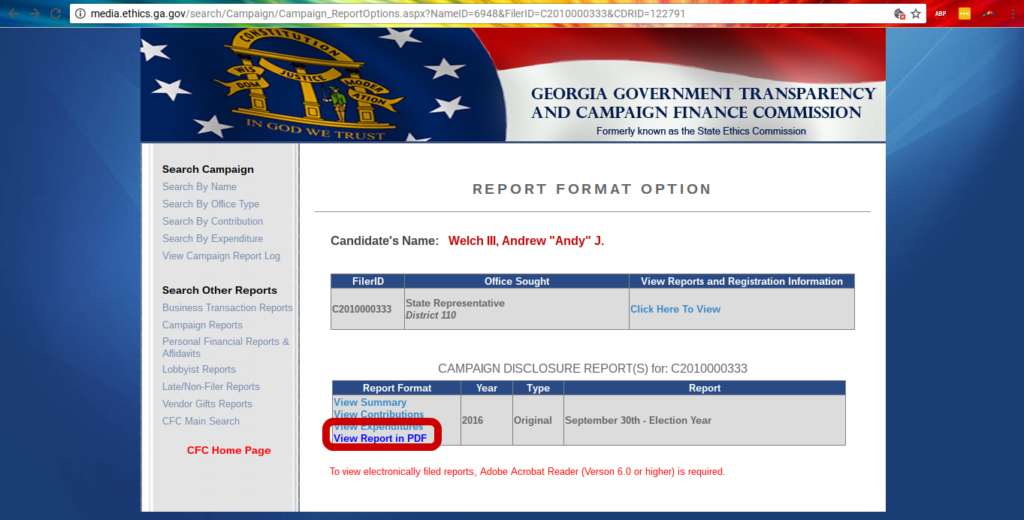
~~~
Phew. Okay, that was quite a bit of information. Just a reminder: you absolutely don’t need to be an expert to vote. Dig into this as much as is interesting to you (certainly freelance reporting is my profession because this work fascinates me). In this case, it may be enough for you to know Rep. Welch is so committed to pro-life politics, he’s giving them money.
As I wrote earlier, definitely be willing to channel your inner Mafioso, but don’t get carried away thinking that every dollar donated is a vote bought.
Next post, I’ll look at who is spending money on the four constitutional amendments on the ballot.
Comment with any questions, and I’ll do the best I can to address them, as well as your own experience looking through campaign contribution disclosure reports.
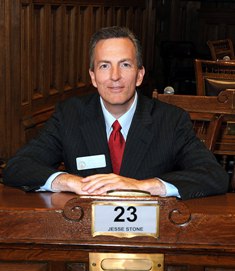

 Yesterday the Senate Judiciary Committee met to take up the adoption bill, HB 159. This Committee is chaired by the handmaiden of Senate Leadership always vigilant and helpful Senator Jesse Stone. He began the committee meeting as he often does- in a quiet and respectful nature, explaining in detail the work that has gone into the legislation at hand. In my experience this is his way of boring you to death before doling out the sucker punch of his substitutes.
Yesterday the Senate Judiciary Committee met to take up the adoption bill, HB 159. This Committee is chaired by the handmaiden of Senate Leadership always vigilant and helpful Senator Jesse Stone. He began the committee meeting as he often does- in a quiet and respectful nature, explaining in detail the work that has gone into the legislation at hand. In my experience this is his way of boring you to death before doling out the sucker punch of his substitutes.











